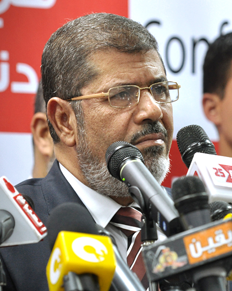Mohamed Morsi: Difference between revisions
imported>Anti villain No edit summary |
imported>Anti villain No edit summary |
||
| Line 8: | Line 8: | ||
|type of villain = Tyrannical President | |type of villain = Tyrannical President | ||
|goals = | |goals = | ||
|crimes = | |crimes = [[Mass murder]]<br>Abuse of power<br>[[Torture]]<br>Conspiracy to shoot protesters<br>Espionage | ||
|hobby = | |hobby = | ||
|skills = }} | |skills = }} | ||
Revision as of 12:04, 13 October 2020

|
| “ | "I believe that Coptic Christians have inherent rights. I believe that they are part and parcel of the fabric of Egyptian society, and have been for over 1400 years. They are undoubtedly as Egyptian as I am, and they have as much right to this country like the one I have ...
We have been commanded, by Almighty God, to respect other beliefs, in the same way that we respect our own. Almighty God granted all people the right and freedom to believe. People are free to believe in God or not to believe, not just Muslims or Christians. If God gave the people the right to freedom in such a tremendously important matter, what about the less significant rights and freedoms ?! Obviously they are guaranteed. " |
„ |
Mohamed Mohamed Morsi Issa Al-Ayyat (8 August 1951 – 17 June 2019) was an Egyptian politician and engineer who served as the fifth President of Egypt, from 30 June 2012 to 3 July 2013, when General Abdel Fattah el-Sisi removed him from office in a coup d'état after protests in June. An Islamist affiliated with the Muslim Brotherhood organisation, Morsi led the Freedom and Justice Party from 2011 to 2012.
Morsi was born in El Adwah, Sharqia Governorate before studying metallurgical engineering at Cairo University and then materials science at the University of Southern California. He became an associate professor at California State University, Northridge from 1982 to 1985 before returning to Egypt to teach at Zagazig University. Associating with the Muslim Brotherhood, which was then barred from office under President Hosni Mubarak, Morsi stood as an independent candidate for the 2000 parliamentary elections. Following the Egyptian Revolution of 2011, which resulted in Mubarak's resignation, Morsi came to the forefront as head of the Freedom and Justice Party. It became the largest party in the 2011-12 parliamentary election and Morsi was elected president in the 2012 presidential election.
As president, Morsi issued a temporary constitutional declaration in November 2012 that in effect granted him unlimited powers and the power to legislate without judicial oversight or review of his acts as a pre-emptive move against the expected dissolution of the second constituent assembly by the Mubarak-era judges. The new constitution that was then hastily finalised by the Islamist-dominated constitutional assembly, presented to the president, and scheduled for a referendum before the Supreme Constitutional Court could rule on the constitutionality of the assembly, was described by independent press agencies not aligned with the regime as an "Islamist coup". These issues, along with complaints of prosecutions of journalists and attacks on non violent demonstrators, led to the 2012 protests. As part of a compromise, Morsi rescinded the decrees. A new constitution was approved by approximately two-thirds of voters in the referendum. On December 8, 2012, the Egyptian military issued its first statement since the outbreak of the protests, stating that this would protect public institutions and the innocent and not allow events to become more dangerous. In Kandil, the cabinet also authorized the army to help the police in Egypt maintain security. Egypt and state media reported that Morsi was moving towards imposing some martial law to secure the streets and allow voting on the draft letter as a referendum on the constitution.
On November 4, almost four months after his arrest, the trial began against Morsi along with 14 other members of the Muslim Brotherhood, he was accused of inciting the murder of protesters during the 2012 Protests in Egypt During the session, Morsi refused to accept the authority of the court and this provoked verbal and physical confrontations between the prisoners and the defense and the prosecution, which forced the judge to postpone the trial until January 8, 2014. The former president was then transferred to the prison of Borg El Arab, a maximum security prison in the middle of the desert.
In June 2013, protests calling for Morsi's resignation erupted. The military, backed by the political opposition and leading religious figures, Abdel Fattah el-Sisi stepped in and deposed Morsi in a coup. It suspended the constitution and appointed Adly Mansour as interim president. Pro-Morsi demonstrations were crushed, resulting in over 800 deaths. Egyptian prosecutors then charged Morsi with various crimes and sought the death penalty, a move denounced by Amnesty International as "a charade based on null and void procedures". His death sentence was overturned in November 2016 and a retrial ordered. Morsi died during trial on 17 June 2019 amid claims that he was being denied appropriate medical care while in custody in the imfamous Tura Prison.
